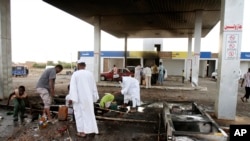Police and protesters have clashed for a fourth day in Sudan, where a government decision to cut back fuel subsidies sparked riots that have left 29 people dead.
Security forces fired tear gas Thursday at protesters in the capital, Khartoum, and in Port Sudan on the Red Sea. Some demonstrators called for President Omar al-Bashir's ouster.
The government's subsidy cut has caused a sharp rise in fuel prices and sparked public anger.
Sudanese security forces have been guarding key installations and gas stations, after rioters set buildings on fire and blocked roads.
The escalating unrest has become one of the biggest challenges to Mr. Bashir's government since he seized power in 1989.
The protests began Monday after the government announced the fuel-subsidy suspension in a bid to help the economy. On Sunday, President Bashir said the subsidies had reached a level that is "dangerous" for Sudan's economy.
Sudan's fuel crisis began after South Sudan became independent in 2011. The new nation took over about three-quarters of Sudan's crude oil production.
Security forces fired tear gas Thursday at protesters in the capital, Khartoum, and in Port Sudan on the Red Sea. Some demonstrators called for President Omar al-Bashir's ouster.
The government's subsidy cut has caused a sharp rise in fuel prices and sparked public anger.
Sudanese security forces have been guarding key installations and gas stations, after rioters set buildings on fire and blocked roads.
The escalating unrest has become one of the biggest challenges to Mr. Bashir's government since he seized power in 1989.
The protests began Monday after the government announced the fuel-subsidy suspension in a bid to help the economy. On Sunday, President Bashir said the subsidies had reached a level that is "dangerous" for Sudan's economy.
Sudan's fuel crisis began after South Sudan became independent in 2011. The new nation took over about three-quarters of Sudan's crude oil production.






